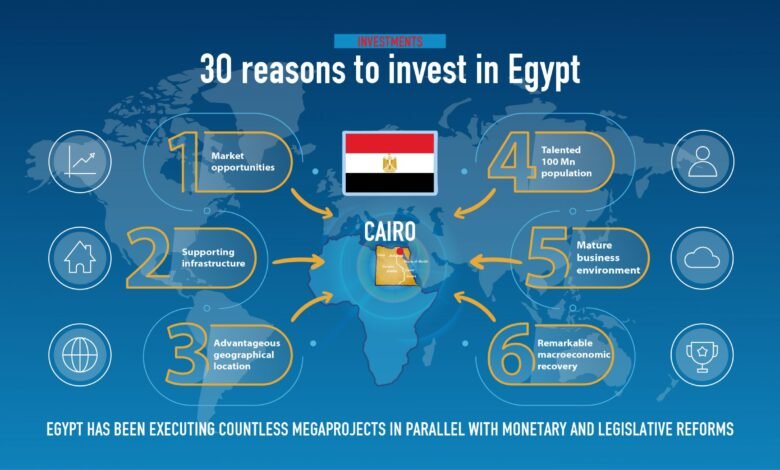Business in Egypt: Opportunities and Challenges

Strategically located at the intersection of Africa, the Middle East and Europe, Egypt has long been a key player in regional trade and trade. With a population of over 110 million and an extensive history of innovation and resilience, Egypt presents compelling arguments to local and foreign businesses. In recent years, Egypt’s economic reforms, infrastructure development and regulatory improvements have been relocated as an increase in starry in the Business in Egypt. However, there are challenges that require strategic planning and adaptability.
Economic Overview
The Egyptian economy is one of the biggest in Africa and the Arab world. Over the past decade, the country has implemented important economic reforms as part of the International Monetary Fund (IMF), including devaluing investments in currency, subsidies and infrastructure. These reforms aim to stabilize the economy, attract foreign investment and promote private sector growth.
Despite global obstacles such as the Covid 19 pandemic and the youngest geopolitical tensions, Business in Egypt continuing to grow steadily. According to the World Bank, Egypt’s GDP growth is estimated to be around 4.2% in 2024, with 2025 forecasts remaining positive. While Egyptian pound volatility and inflation are causing short-term obstacles, the government focuses on structural reform and economic diversification. Business field fundamentals
Several sectors in Egypt offer both advantageous options for domestic entrepreneurs and international investors.
1. Real estate and construction
Urbanisation and population growth manage the high demand for living spaces, commercial spaces and infrastructure. Mega projects such as the new administrative capital and the new city of Alamein demonstrate Egyptian ambitions to modernise the city’s landscape. These projects provide openings for real estate development, construction, construction and support industries.
2. Energy and renewable resources
Egypt has long been an energy centre in a region with high natural gas and oil reserves. In recent years, the country has made considerable advances in renewable energy, particularly the solar and wind. Projects such as Ben Bang Solar Park reflect Egypt’s goal of generating 42% of electricity from renewable energy by 2035, creating investment opportunities for green technology and energy infrastructure.
3. Sightseeing and hospitality
Tourism is an important pillar of the Egyptian economy. The sector will recover after a pandemic setback. Historic location, Red Sea resorts, Nile Cruises attract millions of visitors each year. There are growing spaces for boutique hotels, ecotourism and tourism technology services that improve the travel experience.
4. Information Technology and Startups
The growing population of Egypt and internet penetration has heated up the dynamic startup ecosystem. Cairo is currently considered one of Africa’s best start-up-hubs. Fintech, e-commerce and Edtech are particularly active sectors. By supporting the government through programs such as “Digital Egypt,” the technological landscape is aimed at further expanding.
5. Agribusiness and food processing
Agriculture remains an important economic factor, as there is huge arable land in Upper Egypt and the Delta region. Investments in Agritech, irrigation and food processing are extremely important to improve productivity and meet local and export requirements. Egypt is also working to reduce its dependence on food imports and to present growth potential in the region.
Business environment and reform
The Egyptian government has taken noticeable steps to improve simple businesses. The 2017 Investment Act was a turning point that provided tax incentives, simplifying registration procedures, and guarantees against nationalization. Economic Economic Belt (SEZ) and industrial parks provide additional incentives, especially for export-oriented industries. Additionally, the digitalization of state services has reduced bureaucratic delays and increased transparency. Platforms such as GAFI (Directive for Investment and Directorate for Free Zones) allow online companies to register and license. This is an important leap for business efficiency.
Consider the issues
There are plenty of opportunities, but Business in Egypt environment is not without its challenges.
Bureaucracy and bureaucracy: Despite improvements, some investors still encounter delays in permits, licensing and land allocation.
Foreign currency shortages: The occasional difficulties in accessing foreign currency can affect import and profit profit benefits.
Inflation and economic instability: Periods with high inflation and fluctuations in exchange rates can block short-term investments. Corruption and Governance: Although it has declined in recent years, there are concerns about corruption and inconsistent enforcement of the law.
Political and geopolitical risks: wider regional instability and internal political dynamics can affect the business environment.
Possibilities of foreign investors
Egypt’s foreign direct investment (FDI) has grown particularly from Golander, China and Europe. The government is actively promoting partnerships in infrastructure, energy, logistics and manufacturing. Egyptian members in trade blocs such as Kamea and the African Continental Free Trade Area (AFCFTA) will allow Egyptian companies to access the broader African market. Additionally, the Suez Canal Economic Area (SCZONE) offers a leading location for logistics and export-oriented industries with advanced facilities and preference treatment for investors.
Conclusion
Guestum Country’s Egypt is exposed to transformations characterised by a massive consumer base from real estate to technology, a growing sector, robust reform. For Business in Egypt entrepreneurs and investors willing to control complexity, Egypt offers considerable potential and long-term rewards. The challenges remain, but continued political reform and strategic investment will likely integrate Egypt’s role as a regional business power plant.

